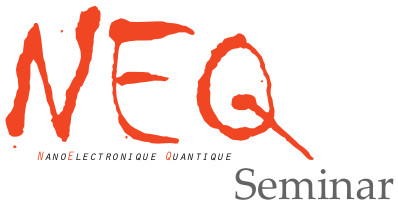- Accueil
- Institut Néel
- Équipes de recherche
- Pôles & Services techniques
- Travailler à l’institut
- Partenariats
- Actualités
- Agenda
- Annuaire

Zoom link : https://univ-grenoble-alpes-fr.zoom.us/j/91808901596?pwd=UWZ2cml2N1VBOEZBenk0d3RJek9rdz09
Résumé/Abstract : The fractional quantum Hall effect is one of the most intriguing phenomena of condensed matter physics, where electronic interactions in a two-dimension electron gas subjected to a strong magnetic field lead to the emergence of highly exotic states with highly unusual properties. Among these, the existence of neutral edge modes, carrying only energy along the edges of the sample in a direction upstream to that of charge transport, has driven more than three decades of research. Their charge neutral nature has made them singularly challenging to probe, such that they were only first observed in 2010. Since then, many works have addressed the thermal transport properties of neutral modes, in particular whether they exchange energy with their neighboring counterpropagating charged edge modes. Significant progress was recently made on this topic, but an important question remained unanswered: can upstream neutral modes exchange energy and thermalize with integer¬-charged edge modes located up to several hundreds of nanometers away from them? This question is far from trivial, as it can profoundly change our understanding of the quantum Hall effect in terms of independent transport channels, and affect the realization of future experiments seeking to explore and exploit the remarkable properties of fractional quantum Hall states. We present heat transport measurements in quantum Hall states of graphene demonstrating that the integer channels can strongly equilibrate with the fractional ones, leading to markedly different regimes of quantized heat transport that depend on edge electrostatics. Our results allow for a better comprehension of the complex edge physics in the fractional quantum Hall regime. G. Le Breton, R. Delagrange, Y. Hong, M. Garg, K. Watanabe, T. Taniguchi, R. Ribeiro-Palau, P. Roulleau, P. Roche, and F. D. Parmentier, Phys. Rev. Lett. 129, 116803 (2022)
